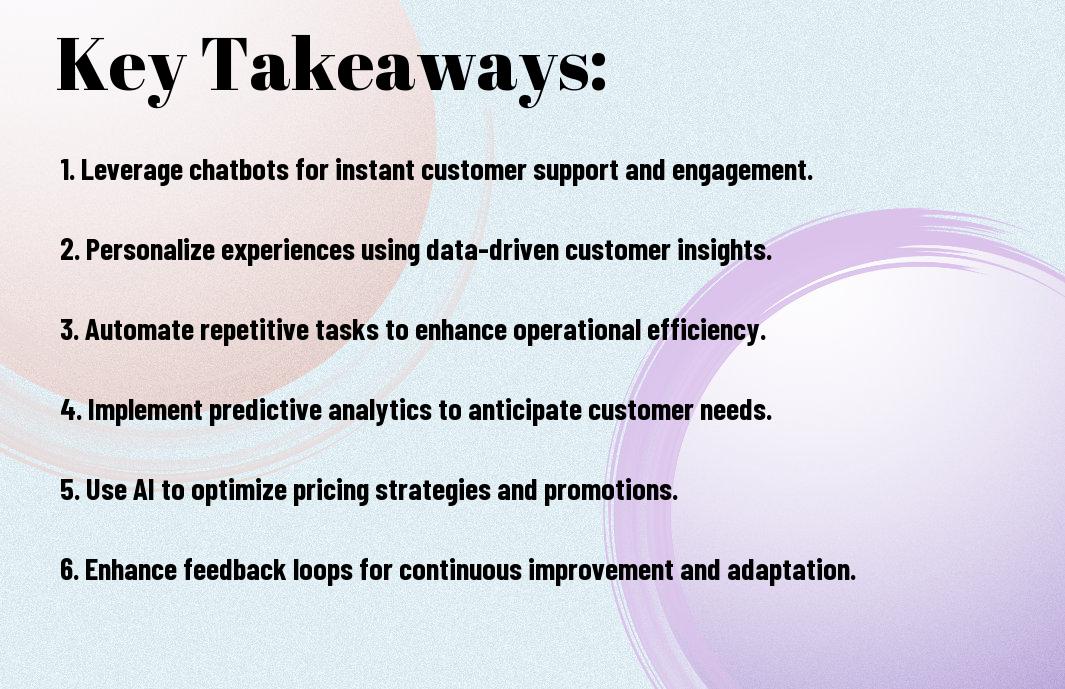As you strive to stay ahead in today’s competitive market, you’re likely looking for innovative ways to enhance your customer experience and drive revenue growth. Your business can benefit from leveraging AI strategies to personalize interactions, streamline processes, and gain valuable insights into customer behavior. By embracing AI, you can unlock new opportunities to boost customer satisfaction, loyalty, and ultimately, your bottom line. You’ll discover how to harness the power of AI to transform your customer experience and propel your business forward.
Key Takeaways:
- Implementing AI-powered chatbots can significantly enhance customer experience by providing 24/7 support, personalized recommendations, and instant resolutions to queries, leading to increased customer satisfaction and loyalty.
- AI-driven analytics can help businesses gain valuable insights into customer behavior, preferences, and pain points, enabling them to create targeted marketing campaigns and tailor their services to meet specific needs, resulting in improved revenue growth.
- Integrating AI into customer service operations can automate routine tasks, freeing up human agents to focus on complex issues, and providing a more efficient and effective support system that drives customer engagement and retention.
- AI-powered predictive modeling can help businesses anticipate customer churn, identify potential upsell and cross-sell opportunities, and develop proactive strategies to retain high-value customers, ultimately boosting revenue and reducing customer acquisition costs.
- By leveraging AI to streamline and personalize customer interactions, businesses can create a competitive advantage, drive long-term growth, and establish a strong reputation for delivering exceptional customer experiences that foster loyalty and advocacy.


The Digital Transformation Imperative
To stay ahead in today’s competitive market, you need to understand the significance of digital transformation in enhancing your customer experience. You can learn more about Customer Experience (CX) with AI: Enhancing the Customer Journey and how it can help you boost revenue.
Customer Expectations in the Digital Age
Across various industries, you’ll find that customers expect personalized and seamless experiences. You need to adapt to these evolving expectations to stay competitive and provide your customers with the best possible experience.
The Cost of Inaction
Expectations for a superior customer experience are rising, and you must be prepared to meet them. If you fail to do so, you risk losing customers and revenue.
A significant portion of your customer base will likely switch to a competitor if you don’t provide the experience they expect. As you consider your digital transformation strategy, you should prioritize customer experience and invest in the necessary tools and technologies to meet their evolving needs and stay ahead of the competition, ultimately driving your revenue growth.
AI-Powered Customer Insights
Some of the most significant benefits of AI in customer experience come from its ability to provide you with deeper insights into your customers’ behavior and preferences, allowing you to make more informed decisions about your business strategy and improve your overall customer experience.
Predictive Analytics and Behavior Modeling
Across various industries, you can leverage AI-powered predictive analytics and behavior modeling to forecast customer churn, identify new sales opportunities, and optimize your marketing efforts to maximize your return on investment and drive business growth.
Real-Time Personalization Engines
Beside traditional methods, real-time personalization engines powered by AI enable you to deliver tailored experiences to your customers, increasing engagement and loyalty by providing them with relevant offers and content that meet their individual needs and preferences.
Analytics play a significant role in real-time personalization engines, as they help you to analyze customer data and behavior in real-time, allowing you to adjust your strategy and provide your customers with the most relevant experience, resulting in increased satisfaction and revenue for your business, and enabling you to stay ahead of the competition by continuously improving your customer experience.
Conversational AI Solutions
Despite the complexity of customer interactions, conversational AI solutions can help you streamline your customer experience. You can leverage these solutions to provide personalized support, enhance engagement, and boost revenue. By implementing conversational AI, you can automate routine tasks and focus on high-value interactions.
Intelligent Chatbots and Virtual Assistants
Beneath the surface of conversational AI lies the power of intelligent chatbots and virtual assistants. You can use these tools to offer 24/7 support, helping your customers find answers and solutions quickly and efficiently. As you explore these options, you’ll discover how they can enhance your customer experience and drive business growth.
Voice Recognition Systems
Toward the forefront of conversational AI are voice recognition systems, enabling you to interact with customers in a more natural, intuitive way. You can use voice recognition to simplify customer interactions, making it easier for them to find what they need and complete transactions.
This technology has the potential to revolutionize your customer experience, allowing you to provide seamless, hands-free interactions. You can use voice recognition systems to analyze customer behavior, preferences, and pain points, gaining valuable insights to inform your business strategies and drive revenue growth. As you consider implementing voice recognition systems, you’ll find that they can help you stay ahead of the competition and deliver exceptional customer experiences.
Hyper-Personalization Strategies
Keep your customers engaged with tailored experiences that cater to their unique preferences and behaviors, leveraging data and analytics to drive your approach, and you will see a significant boost in customer loyalty and retention, ultimately leading to increased revenue for your business.
Dynamic Content Generation
Strategically, you can utilize AI-powered tools to generate content that resonates with your audience, creating a personalized experience that sets your brand apart from the competition, and helps you build a strong connection with your customers.
Micro-Segmentation Techniques
For your business to thrive, you need to adopt micro-segmentation techniques that allow you to divide your customer base into smaller, highly targeted groups, enabling you to craft messages that speak directly to their needs and interests, and drive meaningful interactions.
Considering the complexity of micro-segmentation, you can use AI-driven algorithms to analyze customer data, identify patterns, and create detailed profiles that inform your marketing strategies, helping you to deliver highly personalized experiences that drive engagement, conversion, and ultimately, revenue growth for your business.
Revenue Optimization Through AI
Many businesses are leveraging AI to optimize their revenue streams, and you can too. By implementing AI-powered solutions, you can gain valuable insights into your customers’ behavior and preferences, enabling you to make data-driven decisions that drive revenue growth.
Dynamic Pricing Models
To maximize revenue, you can utilize AI-driven dynamic pricing models that adjust prices in real-time based on demand, competition, and other factors, allowing you to stay competitive and maximize your earnings.
Cross-Selling and Upselling Algorithms
About leveraging AI for cross-selling and upselling, you can use algorithms that analyze customer data to identify opportunities to offer complementary products or services, increasing average transaction values and enhancing customer satisfaction.
Further, by implementing cross-selling and upselling algorithms, you can create a more personalized shopping experience for your customers, as AI-driven recommendations are tailored to their specific needs and interests, leading to increased loyalty and retention, and ultimately, driving revenue growth for your business.
Implementation Roadmap
Your journey to revolutionizing customer experience with AI begins with a well-planned implementation roadmap, outlining key milestones and timelines for integrating AI strategies into your business operations.
Technology Integration Considerations
With the right technology in place, you can seamlessly integrate AI-powered tools into your existing infrastructure, enhancing your ability to collect and analyze customer data, and make informed decisions to boost revenue.
Team Structure and Skill Development
Among the key factors to consider when implementing AI strategies is the development of a skilled team, capable of leveraging AI technologies to drive business growth, and you will need to assess your current team’s strengths and weaknesses to determine the necessary training and hiring requirements.
Plus, as you build your team, you will need to focus on developing skills in areas such as data analysis, machine learning, and natural language processing, ensuring that your team is equipped to maximize the potential of AI and drive meaningful revenue growth for your business, and you will need to stay up-to-date with the latest advancements in AI to maintain a competitive edge.
To wrap up
Presently, you have the power to revolutionize your customer experience with AI strategies, boosting your revenue in the process. You can leverage AI to personalize interactions, streamline processes, and gain valuable insights into your customers’ needs. By implementing these strategies, you can stay ahead of the competition and drive business growth, ultimately enhancing your bottom line and fostering long-term customer loyalty, which will benefit your business in the long run, as you continue to adapt and innovate with AI.
FAQ
Q: What role does Artificial Intelligence (AI) play in revolutionizing customer experience, and how can it impact revenue growth?
A: AI plays a significant role in revolutionizing customer experience by enabling businesses to personalize interactions, predict customer needs, and offer real-time support. By leveraging AI strategies such as chatbots, virtual assistants, and machine learning algorithms, companies can analyze customer data, identify patterns, and deliver tailored experiences that drive engagement, loyalty, and ultimately, revenue growth. Effective implementation of AI can lead to increased customer satisfaction, improved retention rates, and enhanced brand reputation, all of which contribute to boosting revenue.
Q: How can businesses integrate AI into their existing customer experience strategies to maximize its benefits and minimize potential drawbacks?
A: To integrate AI into existing customer experience strategies, businesses should start by identifying areas where AI can add the most value, such as customer service, marketing, or sales. They can then implement AI-powered tools and technologies, such as natural language processing (NLP) and predictive analytics, to automate routine tasks, provide personalized recommendations, and gain deeper insights into customer behavior. It’s also necessary to ensure seamless integration with existing systems, invest in employee training, and establish clear metrics to measure the effectiveness of AI-driven initiatives. By taking a strategic and phased approach, companies can minimize potential drawbacks, such as job displacement or data privacy concerns, and maximize the benefits of AI in enhancing customer experience and driving revenue growth.
Q: What are some key metrics and KPIs that businesses should track to measure the effectiveness of their AI-powered customer experience strategies and their impact on revenue?
A: To measure the effectiveness of AI-powered customer experience strategies, businesses should track key metrics and KPIs such as customer satisfaction (CSAT) scores, net promoter scores (NPS), customer retention rates, and revenue growth. They should also monitor metrics like chatbot conversation rates, virtual assistant engagement, and AI-driven sales conversions to gauge the impact of AI on customer interactions and revenue generation. Additionally, companies can track metrics like return on investment (ROI), return on ad spend (ROAS), and customer lifetime value (CLV) to evaluate the financial impact of their AI-powered customer experience initiatives. By regularly analyzing these metrics and KPIs, businesses can refine their AI strategies, optimize their customer experience, and drive sustained revenue growth.



